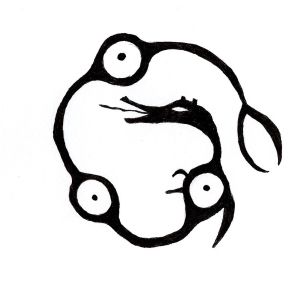The Khanty people are fond of telling fairy tales, especially in the evenings. When, in the forest camp, they are going to bed, an old man continues to tell stories as long as somebody is still awake. One of my friends told me that, as a girl, she tried not to fall asleep while the old man was telling stories, but she never succeeded in hearing the end. Maybe it is never possible to hear the end, because what one usually calls or translates as “a fairy tale” or “a story” actually means “a way” or “a way as destiny”. My good friend and teacher Leonti Taragupta once told me about this.
Natalia I. Novikova, “Self-Government of the Indigenous Minority Peoples of West Siberia: Analysis of Law and Practice”, from People and the Land. Pathways to Reform in Post-Soviet Siberia, ed. Erich Kasten, Berlin: Dietrich Reimer Verlag, 2002, pp. 83-97
Illustration: Enso




